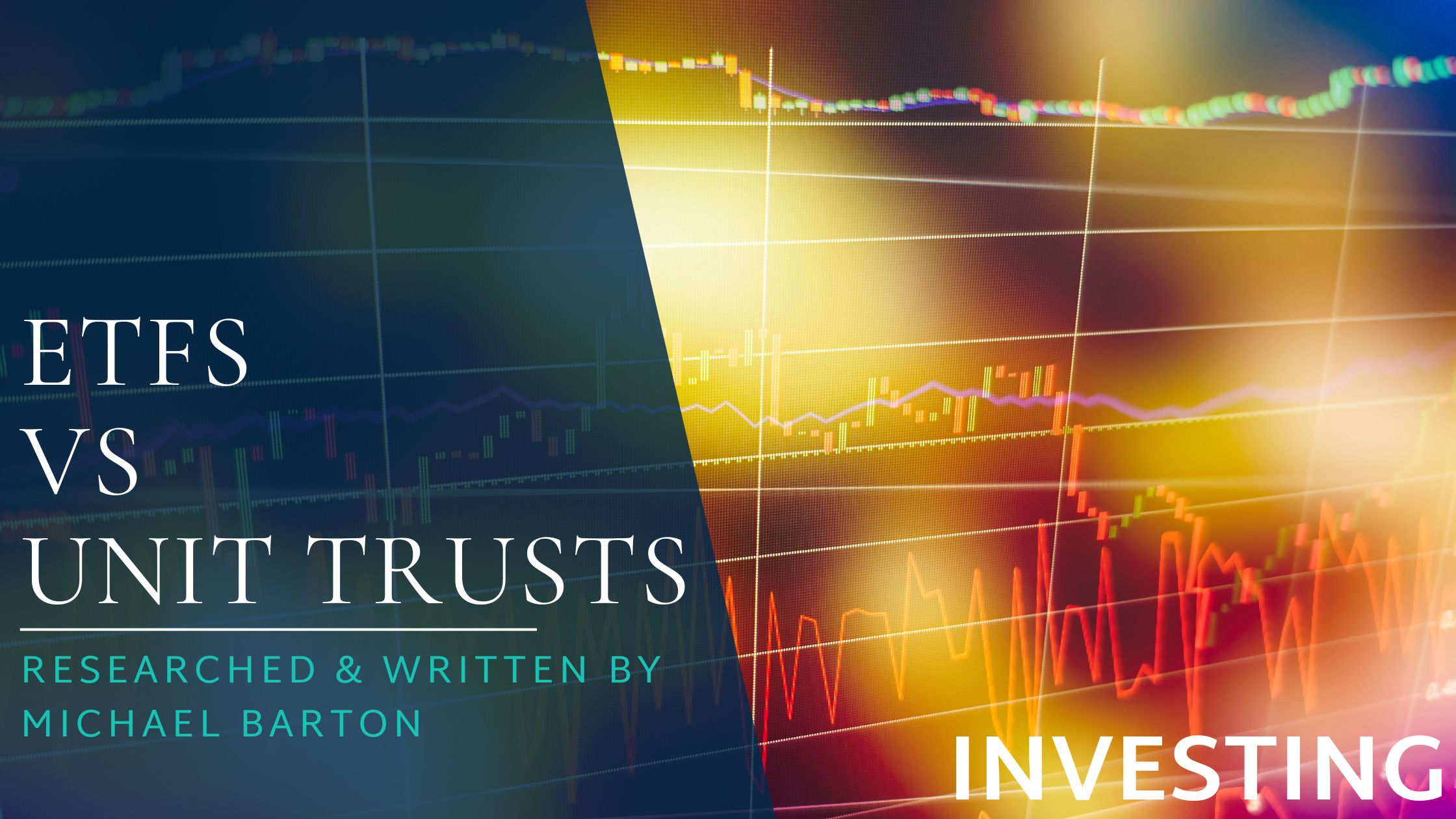Should you invest in ETFs or Unit Trusts? There are distinct features for investors to consider. Here, expert Michael Barton puts ETFs vs Unit Trusts, to help you understand more about which could be your better investment.
When you invest, it’s likely that you’ll invest in a type of collective investment scheme. The most common of these are Unit Trusts. However, since 2000, investors have also been able to invest in Exchange-Traded Funds (ETFs).
I was fortunate enough to have helped in the creation of ETFs in Europe, working with Gary Eisenreich and Tim Collins at Spear, Leeds & Kellogg (later to be bought out by Goldman Sachs). Though I consider my part to have been small, it helped me to become a firm believer in the power of ETFs as investment vehicles for private investors.
In this article, I compare unit trusts and ETFs. Is my bias toward ETFs justified? In a few minutes, you’ll be able to decide for yourself.
30-Second Summary
Unit trusts and ETFs present distinct features for investors.
Unit trusts are priced once a day and usually levy higher ongoing management fees. Typically, you’ll buy a unit trust through a financial advisor, and they take a trailing commission. You can choose between distribution units to be paid any dividends, or accumulation units to benefit from dividend reinvestment and compounding.
On the other hand, ETFs are usually passively managed, meaning lower ongoing management fees. You can trade in ETFs continuously on a stock exchange, either via a broker or on a trading platform.
Both ETFs and unit trusts can be held in tax-efficient accounts and Self-Invested Pensions (SIPPS). I lean toward ETFs for their simplicity, passive index tracking methodology, lower costs, and greater transparency.
However, when choosing between unit trusts and ETFs, you should ensure whichever you select for investment aligns with your financial goals, timeline, and risk profile.
Unit Trust Vs ETF: At A Glance
| Unit Trust | ETF | |
| Pricing | Priced once a day, usually with single pricing | Priced continuously on a stock exchange |
| Active or Passive Management | Usually actively managed | Usually passively managed |
| How to Invest | Via a financial advisor or unit trust/trading platform | Via a broker or trading platform |
| Can You Hold In Tax Efficient Accounts (e.g. ISAs and SIPPs)? | Yes | Yes |
| Initial Fee | Yes | No |
| Dealing Charges | Yes | Yes |
| Ongoing Management Fees | Yes, typically 1%+ | Yes, typically around 0.2% |
| Advice Fee | Usually | Not usually |
| Training Commission | Yes, often | No |
| Dividends | Distribution or accumulation units | Usually paid out, and you would need to reinvest |
| Transparency | Holdings are disclosed quarterly or half-yearly | Holdings are disclosed daily |
What is a Fund?

One of the most basic rules of investing is to diversify. This helps to reduce risk. If you invest in a single company, for example, and that company has a fall in profits, the fall in its share price can be dramatic.
At the extreme, if the company goes bankrupt, you could lose your entire investment.
My first experience of this was a company called Polly Peck International. It was said that if you had invested £1,000 in the company in the early 1980s, your shareholding would have been worth more than £5.6 million the day prior to its collapse.
By that time, Polly Peck was one of the constituents of the FTSE 100. Because of its overnight collapse in September 1990, its shareholders lost every penny between the close of the stock market on one day and the opening the following day.
Of course, the FTSE 100 did not go bankrupt. If you’d held shares across all 100 companies in the index, you’d have lost a tiny proportion of your entire investment – not the whole lot.
Back to the original question – what is a fund?
In its simplest terms, a fund is a collective (or pooled) investment. Your money is lumped with the money of thousands of investors, and used to buy a diversified basket of investment securities. This makes it much easier, less time-consuming, and less costly to own a basket of securities.
Imagine wanting to replicate the FTSE 100 by buying individual shares in all 100 companies. That’s 100 orders to place, and 100 lots of dealing costs to pay.
Then at regular intervals (ideally every day), you’d need to rebalance your FTSE 100 portfolio to account for individual price movements. That’s not practical, and not cost-effective.
So, instead of all this hassle, a collective investment like a unit trust or ETF enables you to place one order to easily gain the exposure you want.
There are thousands of funds you can invest in, allowing you to gain exposure to different stock markets, industries, asset classes, and geographies. You can invest in a narrow fund that gives exposure to a concentrated sector (like tech shares, as an example), or a fund that gives you a diversified exposure to the world’s stock markets (a play on the global economy, if you will).
Two Key Factors – Performance and Cost
When you are deciding which fund to invest in, two key factors that you’ll need to consider are performance and cost.
Okay, here’s the risk warning – past performance is no predicter of future returns. What goes up can go down. But here’s the thing: would you want to invest in a fund managed by a clown (sorry, ‘professional fund manager’) who has underperformed against their peer group for each of the last 10 or 20 years?
I’d be surprised if you said yes. I certainly wouldn’t – it sounds like the fund manager isn’t particularly good at what he or she does.
Here’s another question – would you prefer to invest in an asset class that has consistently outperformed other asset classes over the long term, or an asset class that has been bottom of the pile more times than your grandmother made hot dinners?
If you are investing for the long term, you’ll want to beat inflation – performance matters!
Now, turning to costs, what we’re talking about here is the costs associated with buying and holding an investment. If the investment grows by 7% per year and the associated costs are 1.5%, you’ll be making 5.5%. If the costs are only 0.5%, you’ll be making 6.5% per year.
This difference may only be 1%, but it soon mounts up:
- £10,000 invested with growth of 7% and costs of 1.5% pa. will grow to £29,178 after 20 years
- £10,000 invested with growth of 7% and costs of 0.5% pa. will grow to £35,236 after 20 years
That’s more than £6,000 that has found its way into the fund manager’s pocket instead of yours – equivalent to around 24% of investment growth!
Now you have a foundational knowledge of what a fund is and the importance of performance and costs, let’s take a closer look at the similarities and differences between unit trusts and ETFs.
What is a Unit Trust?

A unit trust is a collective investment. It may hold a range of assets and securities. When you own units in a unit trust, you effectively own the underlying assets.
Most unit trusts are actively managed. Professional fund managers decide what to invest in, with the goal of outperforming the benchmark they are measured against (for example, the FTSE 100).
Other unit trusts (‘trackers’) are less actively managed and set up to replicate the returns of an underlying index.
Unit trusts are usually bought and sold through a financial advisor or via a trading platform. They are priced once a day, meaning that you might place an order today and not deal until tomorrow. You can never be certain at what price you will deal.
Unit trust prices are based upon the net asset value, and many operate on a single price basis – you’ll buy and sell at the same price when you place your order.
Something to consider here is that the price may be based higher or lower, depending upon supply and demand. If there are more sellers than buyers, the price may be positioned below NAV to discourage selling, and vice versa.
You can buy two types of unit trusts: accumulating (dividends are reinvested), or distributing (dividends are paid out). Unit trusts managers usually disclose their holdings quarterly or half-yearly.
What is an ETF?
ETFs share many features with unit trusts, but they are continually traded on a stock exchange. They are dual priced (you’ll pay a slightly higher price to buy shares in an ETF than you would receive when selling them).
Most ETFs are passively managed, tracking an index or economic sector. These aren’t set up to try to beat market returns, but simply to replicate them.
You can buy and sell ETFs at any time while the exchange on which they are traded is open, placing your order via a stockbroker or investment platform.
Most ETFs distribute their dividends, and to reinvest you will need to place a separate buy order, though some total return ETFs will automatically reinvest any dividends or income.
ETFs are transparent, with holdings declared daily.
Total Return – The Difference That Dividend Reinvestment Makes
Reinvesting dividends (or income) can make an enormous difference to your total return. To illustrate this, let’s look at the FTSE 100 between the beginning of 1984 and end of 2022 – an investment timeline of 39 years:
- If you had invested £10,000 in the FTSE 100 and taken and spent the dividends since 1984, by 2022 your investment based on price return would be worth £74,520.
- If you had instead reinvested the dividends, your original £10,000 investment would have been valued at £161,492.
Want to beat inflation over the long term? The FTSE 100 has averaged growth of 4.9% over inflation over the last 100+ years.
Therefore, if you believe that inflation will average 2% over the long term, you might expect the FTSE 100 to return around 7% per year on average. (Again, heed that warning about past performance being no guarantee of future returns.)
The Truth About Fund Managers’ Performance
Would you be right to expect professional fund managers to do better than the general stock market? Surely, the answer is yes, isn’t it? They have the qualifications and experience to pick the stocks that should perform better than others. It’s their job, and it’s for what you pay management fees.
Unfortunately, the reality is quite different. The S&P Indices Versus Active (SPIVA) Scorecard tracks the performance of active fund managers against the S&P Index (an index that tracks the 500 largest US companies).
It found that 79% of active fund managers underperformed the S&P last year – the twelfth year running that fund managers have underperformed.
Costs Associated with Unit Trusts and ETFs
In general, unit trusts are more expensive to buy and hold than ETFs (though there are some unit trusts with a comparable cost base). Here’s how the costs stack up:
Expense Ratio
Fees levied by unit trusts include management fees, admin fees, and operating costs. Typically, this can be between 1% and 2.5% for unit trusts.
You’ll find that ETFs have a far lower expense ratio, with most sitting between around 0.15% and 0.75%.
Dealing Charges
You may have dealing charges levied on the purchase or sale of both ETFs and unit trusts.
Trading Costs
There will be trading costs incurred by the fund. These might include brokerage fees, price spreads, and other fees. How much these are will depend upon how often the fund manager deals and turns over stock.
Choosing a fund that minimises these costs can have a positive impact on net returns.
Other Fees When Investing in Unit Trusts
There are other charges that may be levied when dealing in unit trusts, including:
- Initial fees of 1% to 5% charged by a broker/financial advisor when selling you a unit trust
- Exit fees charged for early withdrawal of your investment
- Platform/custodian fees
- Trailing commissions, payable to your financial advisor, which can be around half of the expense ratio
The Bottom Line
In my view, ETFs offer several advantages over unit trusts:
- Being continuously priced on stock exchanges, they are more flexible and transparent
- You can buy and sell more easily
- They usually have far lower costs than unit trusts, thanks to their passive management style
- Daily disclosure of holdings means you get a clearer picture of how your money is invested
However, despite these benefits, there is also a place for unit trusts in your investment portfolio. Though they are usually accompanied by higher fees, a unit trust managed by a good fund manager can help you outperform the market. (My largest single holding in my personal pension fund is in an actively managed unit trust, focused on global equity income shares, and it’s performing very nicely – I’m reinvesting the dividends, too.)
The bottom line is that, though I lean toward ETFs, what is best for you depends upon many factors – not least your investment objectives, risk profile, and the time you wish to remain invested in the market.

